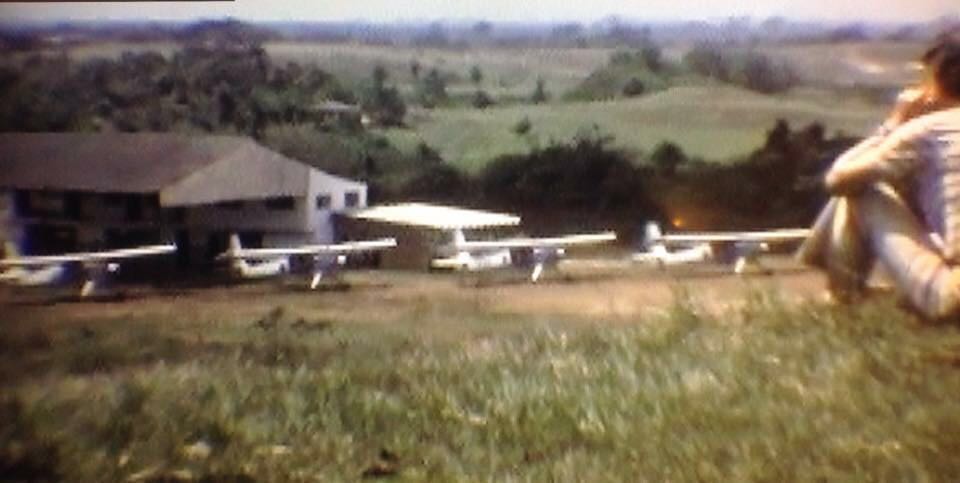Ingresa o regístrate acá para seguir este blog.
@radiobrendan
Most visitors to Colombia have at least heard of, if not visited, Ciudad Perdida, the Lost City. Tucked away high up in the Caribbean coast’s Sierra Nevada de Santa Marta, you could call it the Colombian version of Machu Picchu, one that outdates its more famed Peruvian counterpart albeit.
While much is unknown about its history and those who inhabited it, it’s pretty safe to assume that the cause for the city’s abandonment was down to the arrival of those ‘civilised’ types from across the Atlantic Ocean, namely the Spanish.

Former Lomalinda resident Jonathan Smoak inspects his old school, one that nature has now taken over …
That exodus from the Lost City, however it transpired, could be seen as a harbinger for events much later in the land of the country we now call Colombia. For flights of fear from ruthless enemies didn’t stop with the Spanish conquest nor the coming of the Colombian Republic. In fact, we don’t have to go that far back in history to find examples of people uprooted from what they had once called home.
One of those Colombian ‘lost communities’ is to be found, or not to be found as it is, in the picturesque and now tranquil setting of Lomalinda in the department of Meta, home to Colombia’s plains. Now, as mentioned, forced displacements aren’t novel here, but the Lomalinda case does stand out from others for a number of reasons.
For starters, Lomalinda wasn’t your typical Colombian community or settlement. In fact, it wasn’t Colombian at all. Founded in the 1960s, its origins began as a remote outpost for a Christian missionary / indigenous research project originating from the United States. The Summer Institute of Linguistics (Instituto Lingüístico de Verano in Spanish), as it was known, came to Colombia to study and put into writing the languages of the many indigenous tribes to be found here. As the work was going to take considerable time — we’re talking decades here — the Colombian government gave the organisation unoccupied land close to the town of Puerto Lleras.
It was here, in what the new inhabitants named Lomalinda, which means ‘pretty hill’ in English, the community grew and indeed flourished. Some people came specifically to work on the project, while others came to aide Lomalinda life itself; there was a need for primary and secondary school teachers for the expat children, for example. So you had a mixture of permanent-to-semi-permanent residents and those on more of a temporary stay.
While the language in the community was English, some Colombians did come to settle nearby and it wasn’t completely cut off from what was going on around it.
However, considering the deteriorating security situation that was to come, Lomalinda’s residents might have wished they could have lived in a bubble. As the Farc guerrillas gained control around the area in the 80s, it signalled the beginning of the end for what many residents had seen as an idyllic, lake-shore life. How could a small, defenceless Western community, however vibrant it had been, survive with self-proclaimed communists menacingly nearby in what was to became a war zone?
After threats, kidnappings and a number of deaths, the last of the expat Lomalinda residents left in the mid-90s. Following their departure, the Colombian army moved in to secure the area. Thus began a process of degeneration; military personnel stationed in Lomalinda helped themselves, unsurprisingly, to some of the ‘goodies’ left behind. The army, for reasons unknown, departed in the late 90s and that left the way open for the Farc, who had control of nearby Puerto Lleras, to continue the destruction of the village. Over a number of weeks the guerillas cleared out everything they could. Houses basically disappeared, bar any brick walls they had and their foundations.

Sunrise on Lomalinda lake. Despite its sad recent history, the area has tourism potential & is only five hours from Bogotá. (Photo from Jonathan Smoak.)
As the country’s conflict rumbled on, the Farc lost control of the area. Yet, as it has been for many places in rural Colombia, until recently it was still seen as a no-go location. It’s not exactly guerrilla nor paramilitary free today, but it’s far, far safer than it was.
Something resembling ‘normal’ life seems to be returning to Lomalinda, minus the English-speaking Westerners as residents that is. In their place, on many of the foundations they built, have come those of a more common hue for these parts. Some of these new arrivals were displaced from elsewhere themselves due to Colombia’s conflict. That such rather desperate folk with few opportunities have taken ownership of what was left behind might be of some comfort to the departed expats.
Yet, as the locals are quick to point out, this is still an area where guerrillas and paramilitaries (or paracos as they’re also called) linger. Things may not be as dangerous as before, however it’s hard to find anyone in favour of the peace deal that the government of President Juan Manuel Santos is pursuing in Havana, Cuba. For the locals here, they envisage no change to the Farc — or whatever those using that name now might call themselves post any ‘peace deal’ — collecting taxes on the one hand, and paramilitaries controlling their ground on the other.
Whatever the future may hold, what Lomalinda’s current residents want now is to carry on with their lives without fear of forced eviction or death hanging over them. Is that too much to ask? Considering what’s gone before, they could be forgiven for thinking ‘yes’.
__________________________________________
Facebook: Wrong Way Corrigan – The Blog & IQuiz “The Bogotá Pub Quiz”.




jotajota1968 can you give examples of how it was detrimental?
- Me gusta
0
- No me gusta
0
ReportarCalifica:
marcioarredon0619 Lomalinda no era un proyecto del gobierno. Me gustaría saber de que manera crees que el Instituto fue imperialista… Pregunto lo mismo a arnold925272. Yo me crié en Lomalinda y en las tribus de las Amazonas con varias familias del Instituto.
- Me gusta
0
- No me gusta
0
ReportarCalifica:
Buen proyecto para un gobierno que aún hoy no puede garantizar el bienestar de su población: educación para el trabajo, una segunda lengua… malo lo de la imposición de la cultura religiosa a los indígenas. Malo que todo proyecto de cooperación sea visto como la carta de presentación para el posterior “imperialismo”. No se si sea mejor el imperialismo de la guerrilla, el de los narcos, el de los paras o el del abandono estatal.
- Me gusta
0
- No me gusta
1
ReportarCalifica:
Adivino que el proyecto del Instituto Lingüístico de Verano hizo más cosas buenas que malas. Pues, me gustaría pensar esto. ‘Colombianos’ (de raíces españolas o otras) han tratado los indígenas en esta tierra tan mala como otras, o peor. Pero tenemos que esperar que el país está siguiendo adelantado y mejorando en contexto del tratamiento del pueblo …
- Me gusta
0
- No me gusta
0
ReportarCalifica:
http://www.redalyc.org/articulo.oa?id=15900911 Instituto Lingüístico de Verano, instrumento del imperialismo. México, Colombia, Perú, Códigos de Guerra
- Me gusta
0
- No me gusta
0
ReportarCalifica:
I visited lomalinda with my family as a kid during the 70s. I was a very religious and well organized community living in a small and beautiful oasis. You forgot to menction that the linguistic work was also used for missionary purposes which in some cases was detrimental to the indigeneous people and culture.
- Me gusta
0
- No me gusta
0
ReportarCalifica:
Well it is mentioned that both missionary and linguistic work was carried out. I imagine by ‘detrimental’ you mean that the conversion to Christianity impacted negatively on indigenous culture and their way of life? Impact with the Western style of life was (and is) pretty much inevitable for them (however sad we may think that is) and while I don’t know exactly how the missionaries from Lomalinda conducted themselves when they met indigenous, I’m guessing they didn’t abuse nor murder the natives (in contrast, see the previous article: http://bit.ly/2akYEdg). For the record, I’m not Christian!
- Me gusta
0
- No me gusta
0
ReportarCalifica:
From Jonathan Smoak (it’s strange the way El Tiempo doesn’t allow people to make reply comments to others):
“jotajota1968 can you give examples of how it was detrimental?”
- Me gusta
0
- No me gusta
0
ReportarCalifica: